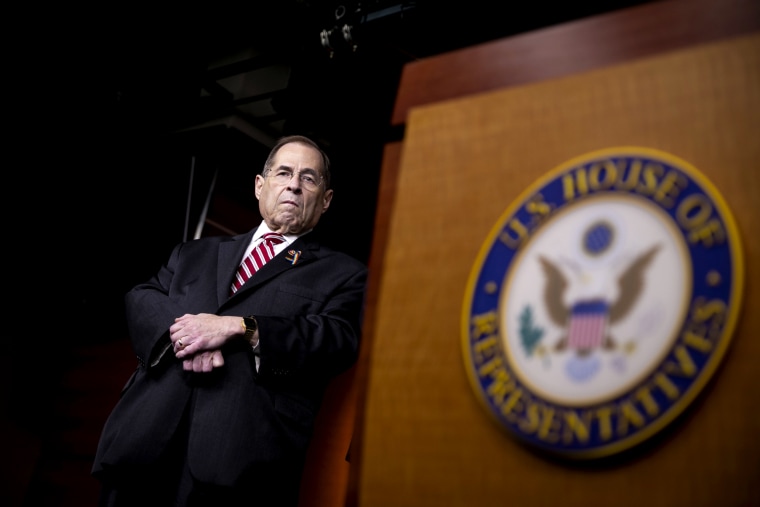House Judiciary Committee Chairman Jerrold Nadler, D-N.Y., said Sunday that former special counsel Robert Mueller's report "presents very substantial evidence" that President Donald Trump "is guilty of high crimes and misdemeanors."
Speaking with "Fox News Sunday" ahead of Mueller's highly anticipated congressional testimony on Wednesday, Nadler added that "we have to let Mueller present those facts to the American people and then see where to go from there, because the administration must be held accountable, and no administration can be above the law."
"It's important that we not have a lawless administration and a lawless president," Nadler said. "It's important that the people see where we're at and what we're dealing with."
On CBS's "Face the Nation," House Intelligence Chairman Adam Schiff, D-Calif., said he wants Mueller "to bring" his report "to life" during his testimony, explaining it to Americans who have not read it.
"It's a pretty damning set of facts about a presidential campaign, in a close race, welcoming help from a hostile foreign power," Schiff said. "Not reporting it, but eagerly embracing it to their campaign strategy, lying about it to cover up, then obstructing an investigation into foreign interference again to try and cover up."
Speaking with NBC News' Kristen Welker at the Aspen Security Forum on Saturday, Schiff said "there were certain things certainly that we would like to explore that go beyond the report."
"I don't want to get into those specifics, and some of these areas we are getting answers to," Schiff said. "Prior to his testimony, we did spend about five hours with one of his staff. Of our particular interest in the Intelligence Committee are the counterintelligence findings."
In his report, Mueller extensively detailed Russia's efforts to interfere in the 2016 election, multiple contacts between the Trump campaign and associates with Russians, and Trump's efforts to quash the probe. Mueller wrote that the evidence he reviewed was not enough to establish a Trump-Russia conspiracy and that he could not come to a traditional prosecutorial decision on obstruction in part because of the Justice Department Office of Legal Counsel's opinion that a sitting president cannot be indicted.
"Accordingly, while this report does not conclude that the President committed a crime, it also does not exonerate him," Mueller wrote, later adding that Trump's "efforts to influence the investigation were mostly unsuccessful, but that is largely because the persons who surrounded the President declined to carry out orders or accede to his requests."
Mueller's testimony comes after he said in May that his more than 400-page report on Russian interference in the 2016 presidential election, whether the Trump campaign and allies conspired with Russia and whether Trump obstructed justice "speaks for itself," and that he would make no comment in testimony "beyond what is already public."
Mueller added on the question of whether Trump obstructed justice, "If we had had confidence that he clearly did not commit a crime, we would have said so."
Schiff told NBC's Welker that one question he would ask if he knew Mueller would be able to openly answer any topic is whether the former special counsel "felt bound by the OLC opinion not to indict the sitting president," and whether Trump should "be indicted once he leaves office?"
"He is not going to answer that question," Schiff said. "We have a far better chance of the love affair in North Korea working out than we do of getting him to answer that question. But nonetheless, there are other ways of asking that question."
After Mueller submitted his report to Attorney General William Barr in March, Barr released a four-page summary of the report which the special counsel said "did not fully capture the context, nature, and substance" of his investigation.
On Sunday, Nadler said the point of Mueller's testimony was so the American people can "hear directly from" him about "what his investigation found."
"The president and the attorney general and others have spent the last few months systematically lying to the American people about what the investigation found," he continued. "They've said that it found no collusion, that it found no obstruction, that it exonerated the president. All three of those statements are absolute lies."
Asked about questions Republican lawmakers plan to ask, including those on the legality of the Russia probe's origins, Nadler said if Republicans "want to talk about this irrelevancy, let them waste their time."
"But what's before the American people now is the conduct of this president and what Mueller found about the conduct of this president, and where we go from here," he said.

